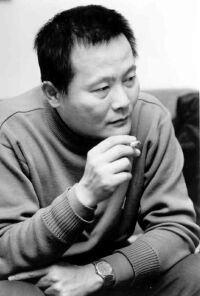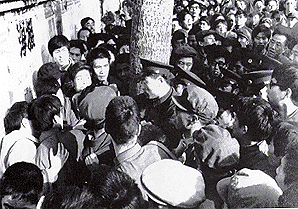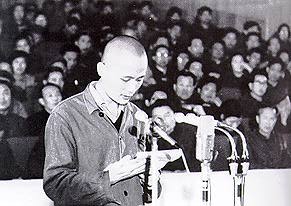|
WEI Jingsheng is the
best-known Chinese human rights and democracy fighter and is the leader for
the opposition against the Chinese Communist dictatorship. He was sentenced
to jail twice for a total of more than 18 years due to his democracy
activities, including a ground breaking and well publicized essay he wrote in
1978: "the Fifth Modernization". He is the author of "Courage to Stand Alone
-- letters from Prison and Other Writings", which compiles his articles
written initially on toilet papers in jail.
Wei Jingsheng is a winner of numerous human rights awards, including the
Robert F. Kennedy Memorial Human Rights Award in 1996, the European
Parliament's Sakharov Prize for Freedom of Thought, the National Endowment
for Democracy Award in 1997, International Activist Award by the
Gleitsman Foundation in 1993 and the Olof Palme Memorial Prize in 1994.
Wei Jingsheng has been nominated seven times for Nobel Peace Prize since
1993.
He was praised in numerous places with varies titles, such as "Father of
Chinese Democracy" and "Nelson Mandela of China". Thousands of entries about
him can be found on the Internet in many languages, not just in English and
Chinese.
Wei
Jingsheng is the best-known Chinese human rights and democracy fighter
against the Chinese Communist dictatorship.
Wei Jingsheng was born in Beijing, China in 1950. His given name is very
common and is an indication of the pride of his parents; a pride shared by
many in the days immediately following the creation of the People's Republic
- "Jing" means "capital" and "Sheng" means "birth." He is the eldest of four
children. His parents were longtime Chinese Communist Party
cadres. He was brought up in the prestigious Party schools, and was exposed
to the internal dramas of the Beijing party elite.
At the beginning of the Cultural Revolution in 1966, the sixteen-year-old Wei
left Beijing to explore the country for himself. He traveled throughout
north and northwest China. Seeing firsthand the true affects that communism
had on the Chinese people. It was during this time that he first began to
formulate his opinions on the Chinese Communist Party and the future of the
Chinese people. By the time the Cultural Revolution ended in 1976, Wei had
been "sent down" to the countryside in his ancestral hometown in Anhui
Province and also served in the People's Liberation Army. The ten formative
years he spent gaining a better understanding of the Chinese people's
situation left an indelible mark on his thinking. |
 |
After moving back to Beijing, Wei took a job as an electrician at the Beijing
Zoo before he was arrest on 29 March 1979. In 1978, a series of workers,
intellectuals, and artists posted their thoughts and statement on a piece of
wall in Beijing. The place, and the period, became known as The Democracy
Wall. At this time, Wei wrote an essay entitled "The Fifth Modernization"
which stated that without democracy, China could not truly modernize. |
|
His essay caused a sensation -- not only because it openly assaulted the
"people's democratic dictatorship" propaganda of the Communists, but also
because the author dared to sign the essay with both his real name and
address. Wei joined a few friends in publishing an underground magazine
called "Exploration". In its last edition, Wei wrote another article,
"Democracy or a New Dictatorship?" which identified Deng Xiaoping, then
Communist leader of China, as the new dictator. Three days later, Wei
Jingsheng was arrested.
In 1979, Wei was charged with having passed "secret" information concerning
the 1979 Sino-Vietnamese war to a foreigner, and engaging in
""counter-revolution propaganda and agitation." He was sentenced to 15 years.
He spoke in his own defense, and a copy of his statement was smuggled out of
the courtroom and distributed in China and to the foreign press. He was
first on death row for eight months, and then in solitary confinement for
nearly five years. He was kept in two other forced labor camps under strict
supervision from both guards and prison handlers until 1993 when he was
released. Within six months he was arrested a second time. He was tried
again, convicted of "counter-revolution" and sentenced to another 14 years.

In 1997, after a total of 18 years in prison, Wei was taken from his cell and
placed on a plane bound for the United States as a bargain result between
then U.S. President Clinton and the Chinese President Jiang ZeMin. Wei
maintains that he was not freed, but that his exile is further punishment.
Currently residing in Washington DC, Wei Jingsheng has not been silenced by
his forced exile. There are numerous reports of his work outside of China
for the Chinese cause. Many of his articles are published in major
newspapers including English, more in Chinese. Every week, he gives speeches
and commentaries through various radio and TV stations, especially to the
Chinese audience via Radio Free Asia, Voice of America, and BBC, etc. His
close ties to many congressional members and legislators, as well as
governmental officials of many democratic countries, enable him to represent
the Chinese democratic force and use his influence to push for human rights
and democracy in China.
he wrote in 1978: "the Fifth Modernization". He is the author of "Courage to
Stand Alone -- letters from Prison and Other Writings", which compiles his
articles written initially on toilet papers in jail.
Wei Jingsheng is a winner of numerous human rights awards, including the
Robert F. Kennedy Memorial Human Rights Award in 1996, the European
Parliament's Sakharov Prize for Freedom of Thought, the National Endowment
for Democracy Award in 1997, and the Olof Palme Memorial Prize in 1994. Wei
Jingsheng has been nominated seven times for Nobel Peace Prize since 1993.
In 1998, he founded the Overseas Chinese Democracy Coalition (OCDC), which is
an umbrella organization for many Oversea Chinese democracy groups. The
OCDC has many members over dozens of countries. He has been serving as its
chairman since then. He is also the president for the Wei Jingsheng
Foundation, which is a non-profit organization registered in New York.
|


